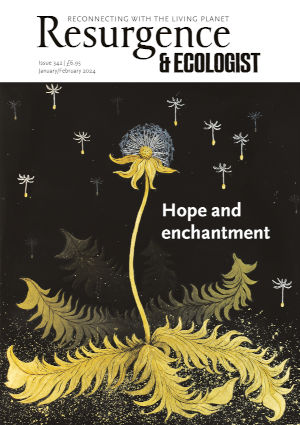In her brief preface, Catrina Davies describes Once Upon a Raven’s Nest as “a portrait, not a biography”. But what makes the book so striking is that it appears to be a ‘self-portrait’, the life story of a man – named Thomas Hedley in the text – who spent most of his working life outdoors. The written words are Davies’, but the voice – forthright, funny and highly original – is entirely his. Ceding the first-person narrative to a biographical subject is hardly unheard of – Patrick Barkham used the same approach in The Swimmer, his recent biography of Roger Deakin – but seldom has it been done so successfully.
Hedley was born in Taunton in 1953 and grew up around Exmoor in a world of agricultural labour, guns, working dogs, tight purse strings, and place lore. His grandfather was a small farmer who surrendered his land to a compulsory council purchase for housing, and his father was a farm worker who lost his livelihood to ill health. Hedley’s own career as a forester was dominated by hydrocarbon-driven machinery: tractors, quad bikes, chainsaws. Davies got to know him in the final decade of his life – he died in 2021 – when he was confined to a wheelchair by a serious spinal injury. This book is the product of their friendship.
The book’s subtitle is A Life on Exmoor in an Epoch of Change, and Davies has sought to embed the story within a wider narrative of catastrophic environmental change. At beginning and end, the book expands beyond the protagonist’s 68-year lifespan into deep time, to underscore the damage we have done to the planet. And throughout the narrative, brief intercalary chapters itemise the specifics – the point in 1988 at which the safe boundary of CO2 levels in the Earth’s atmosphere was surpassed, for example.
Davies has a novelist’s instinct for narrative structure. Though the broad thrust of the book is chronological, we know from the outset that Hedley’s intense physicality ends up curtailed by some kind of accident. This brings a compelling tension to each mishap with a tractor, each car crash, each bar-room fight. A novelist, however, might have made the protagonist a less complex character – an unattractive revenant of a brutal old-time countryside. The non-fiction Hedley does kill animals, follows the local hunt, remains tied to the traditions of his forebears. But he also spends time working on German building sites, briefly marries an American expat, takes up surfing and downhill skateboard racing, listens to Pink Floyd. He too changes, shifts, softens over the course of his complicated life, and is always instinctively concerned for the wellbeing of the landscape and its wildlife, even as he kills individual creatures. “I try to square the part of me that loves animals with the part of me that loves hunting, but I can’t,” he says. “I never could.”
What gives the book a particular frisson is that Davies does not remove herself from the narrative. We see her as Hedley sees her, asking questions, scribbling in her notebook, fumblingly assisting in his post-accident care – and now and then inserting a subtle note of critical interrogation. We also get glimpses of Hedley’s own active participation in the project. He asked – for reasons that are not explained – to be called Thomas Hedley in the book’s pages, rather than his actual name, Hedley Ralph Collard. And at the very end of his life, knowing that he wouldn’t live to see it published, he tells her, “It shouldn’t be too dark … it should be funny.” Davies has succeeded in that: it is funny, compelling and, in its closing chapters, deeply moving.
It will be for those who knew the protagonist in life to say whether Davies has successfully captured Hedley’s actual voice; but for an outsider, Once Upon a Raven’s Nest feels like a genuine and highly original collaboration. It gives agency to the sort of person who seldom gets to publish a memoir of their own, making them fully human and ultimately sympathetic in the process.
Once Upon a Raven’s Nest: A Life on Exmoor in an Epoch of Change by Catrina Davies. riverrun, 2023. ISBN: 9781529424997.







